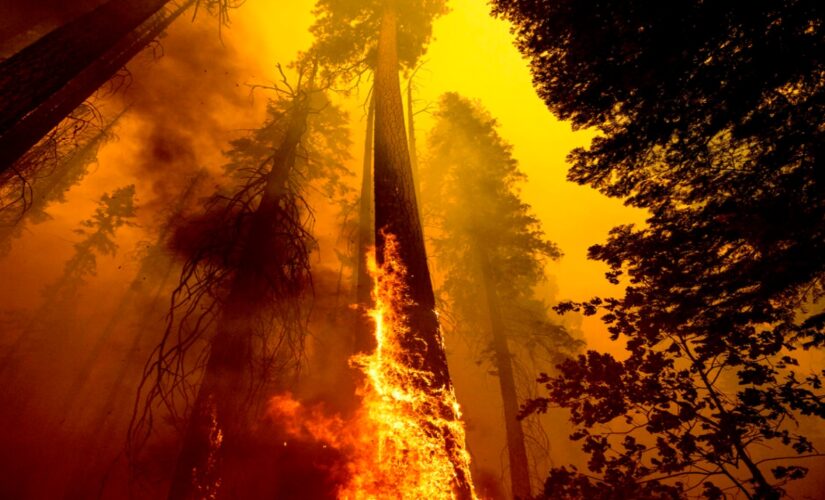NEWYou can now listen to Fox News articles!
A major environmental group has continued to pursue litigation blocking the same wildfire forest management techniques that are currently helping to save a mass of iconic sequoias in California.
The Earth Island Institute, a California-based organization, filed a federal lawsuit in June asking the court to halt a “biomass removal and thinning” project proposed by Yosemite National Park and the National Park Service (NPS). The lawsuit argued the plan would benefit commercial loggers, negatively impact endangered wildlife and was unnecessary, asserting dead tree density was irrelevant to potential wildfire proliferation.
INTENTIONAL FIRES HELPED SAVE YOSEMITE SEQUOIAS FROM WILDFIRE, ECOLOGIST SAYS
Under the proposal, the NPS had planned to cut down “hazard trees” and remove biomass like fallen dead trees that could contribute to wildfires, according to project documents. On July 5, though, Yosemite National Park agreed to halt its plans pending a court decision in the case.
Previous fuel reduction treatments, meanwhile, have helped protect historic sequoia trees in Yosemite’s Mariposa Grove amid a raging Washburn wildfire that has ripped through the park since July 7, two days after the NPS plan was halted. Firefighters have been able to contain 25% of the wildfire which has spread across 2,340 acres of the park.
The Washburn Fire burns across Mariposa Grove in Yosemite National Park.
((AP Photo/Noah Berger))
“We’ve been preparing for the Washburn Fire for decades,” John Dickman, a Yosemite forest ecologist, said Tuesday. “It really just died as soon as it hit the grove.”
White House assistant press secretary Abdullah Hasan acknowledged Wednesday that efforts to protect the forest from wildfire damage “include removing hazardous fuels,” or thicket and dead trees that are contributing to the fire. In addition, a federal report on the ongoing wildfire fire stated that it is spreading through an area with a “very heavy accumulation” of fuels.
However, Earth Island Institute and other organizations have continued to push against similar NPS forest fire management techniques. Earth Island’s John Muir Project and a series of other green groups recently announced their opposition to the bipartisan Save Our Sequoias (SOS) Act introduced last month which would boost such efforts, according to its co-sponsors.
CALIFORNIA FIREFIGHTERS MAKE PROGRESS ON YOSEMITE WILDFIRE THREATENING SEQUOIAS
“It’s very telling that the loudest voices opposing the SOS Act are the same ones actively thwarting scientific forest management,” one of the bill’s co-sponsors House Natural Resources Committee Ranking Member Bruce Westerman, R-Ark., told Fox News Digital. “Just last week, the John Muir Project successfully blocked a forest restoration project in Giant Sequoia groves in Yosemite, hours before the Washburn Fire started in the park.”
“All experts on the ground right now are saying the only thing preventing the Mariposa Grove from becoming a raging inferno is the active management National Park Service rangers carried out in the park,” he continued. “This confirms what we’ve known all along: if we’re fighting a fire as it spreads, we’ve already lost.”
The SOS Act — which was introduced by Westerman, House Republican Leader Kevin McCarthy, R-Calif., Rep. Scott Peters, D-Calif., and several other lawmakers on June 23 — would “prioritize wildfire risk reduction treatments in the highest-risk groves” and promote scientific forest management activities, according to its sponsors.
ALASKA WILDFIRE SEASON SETS RECORD
But Chad Hanson, a research ecologist at the John Muir Project, said the NPS plan would have taken place “miles away” from where the Washburn fire is located. He also said the John Muir Project supports small “prescribed burning” plans and downplayed the current wildfire’s impact, saying “sequoias need mixed-intensity wildfire” to reproduce.
House Minority Leader Kevin McCarthy, R-Calif., an SOS Act co-sponsor, addresses reporters on Dec. 3, 2021.
(AP Photo/J. Scott Applewhite)
“The Washburn fire is a relatively small, very slow moving surface fire, burning mainly at low intensity in mild to moderate fire weather, including in dense forests with no forest management history and an abundance of live and dead trees,” he told Fox News Digital.
“This underscores what John Muir Project and hundreds of scientists have been saying for years: it’s not primarily about the density of live or dead trees, it’s about the weather and climate, and climate change,” Hanson continued.
CLICK HERE TO GET THE FOX NEWS APP
The John Muir Project tweeted Tuesday that the SOS Act “is nothing more than a Trojan horse to reduce environmental reviews,” a criticism rejected by the bill’s sponsors. A spokesperson for Westerman said a plain reading of the legislation’s text shows that it wouldn’t waive any environmental reviews or delegate them to third parties.
The NPS didn’t respond to a request for comment from Fox News Digital.




